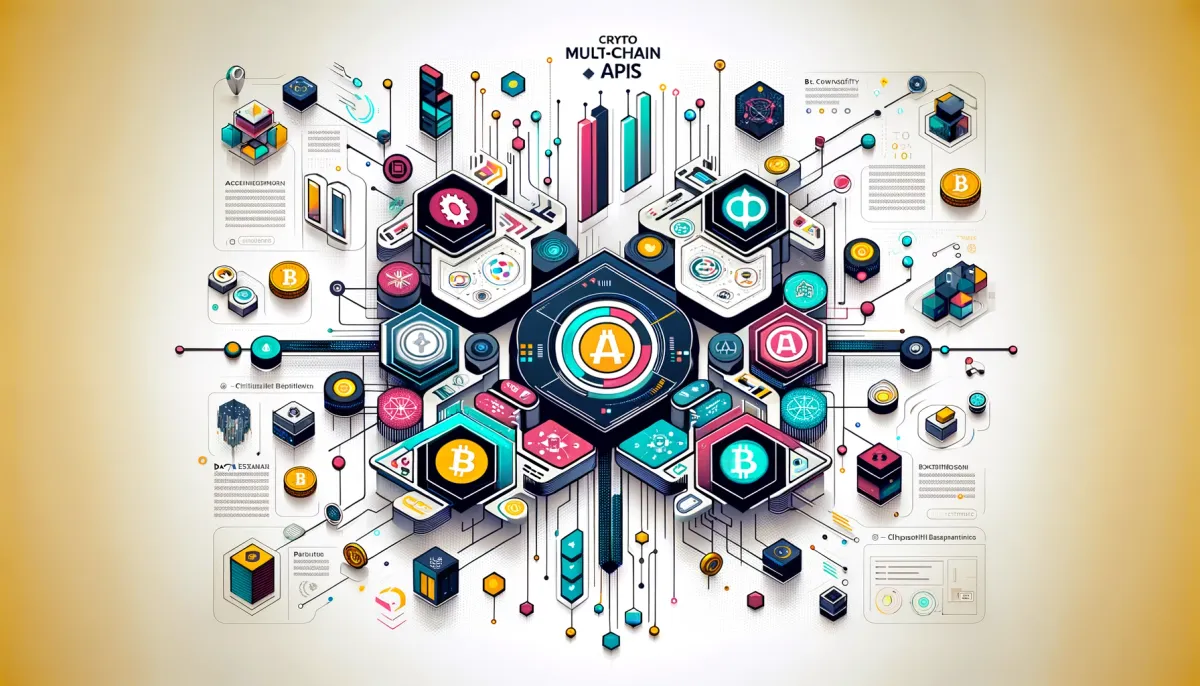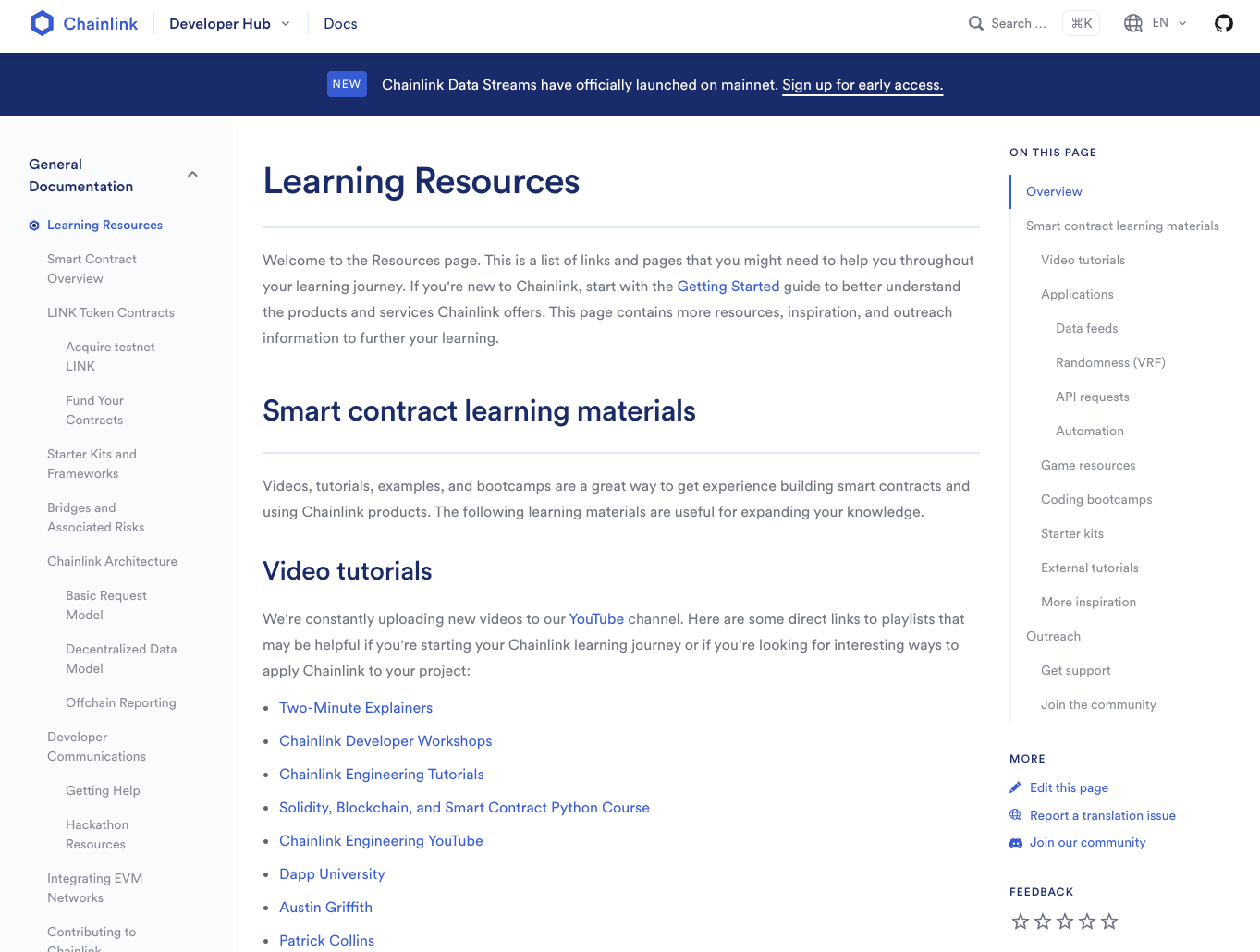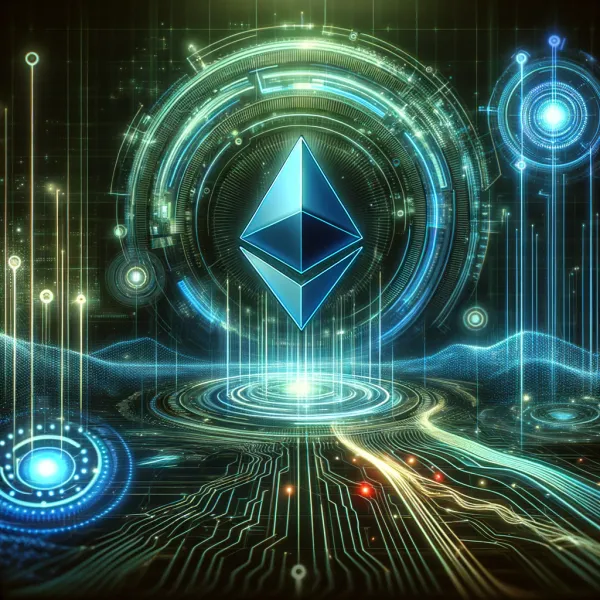Top 7 Crypto Multi-Chain APIs

Introduction
In the rapidly evolving landscape of blockchain technology, the ability to operate across multiple chains is not just an advantage; it's becoming a necessity. Multi-chain environments offer unprecedented flexibility, allowing users to take advantage of the unique features and benefits different blockchains provide. This is where Crypto Multi-Chain APIs come into play, serving as essential tools for developers aiming to build seamless, interoperable applications that transcend the limitations of single blockchain ecosystems. As we delve into the top multi-chain APIs, understanding their importance and the criteria for their selection becomes crucial for leveraging the full potential of the decentralized world.
The Importance of Multi-Chain APIs
The advent of multi-chain APIs marks a significant milestone in the crypto domain, addressing some of the most pressing challenges faced by developers and users alike. These APIs facilitate a harmonious interplay between different blockchains, enabling the transfer of assets, data, and functionality across ecosystems without friction. Here's why they are becoming indispensable:
- Interoperability: Multi-chain APIs are the linchpins of blockchain interoperability, allowing diverse networks to communicate and share resources efficiently.
- Scalability: By distributing operations across multiple chains, these APIs help overcome the scalability issues plaguing single-chain solutions.
- Flexibility and Choice: Users and developers are no longer confined to the constraints of a single blockchain, enabling them to choose the best aspects of each.
- Enhanced Functionality: Multi-chain APIs open up a world of new functionalities, from cross-chain transactions to multi-chain smart contracts, enriching the crypto ecosystem.
Criteria for Selection
Choosing the right multi-chain API is pivotal for the success of any decentralized application. Here are the critical criteria to consider:
- Security: The API's ability to ensure secure communication between different blockchains is paramount. Look for APIs with robust security protocols to protect against hacks and vulnerabilities.
- Reliability: Consistent uptime and a high response rate are essential for maintaining seamless operations across networks. Opt for APIs known for their reliability.
- Supported Chains: The variety and number of supported blockchains matter. An API covering a broad spectrum of chains provides more flexibility and opportunities for integration.
- Documentation and Community Support: Comprehensive documentation and active community support can significantly ease the development process, providing valuable resources and troubleshooting assistance.
- Cost: Understand the fee structures and the availability of a free tier to assess the API's cost-effectiveness for your project.
Selecting a multi-chain API that aligns with these criteria will empower your applications with the capability to operate across the diverse landscape of blockchain technology, unlocking new possibilities and fostering innovation in the decentralized space.
Top 7 Crypto Multi-Chain APIs
As we delve into the multi-chain API landscape, our focus is on platforms that offer the most in terms of security, interoperability, and ease of use. These APIs are pivotal for developers looking to build decentralized applications that span multiple blockchain networks. Let's explore the leaders in this space, starting with a groundbreaking offering:
1. Mobula API

- Overview and Key Features: Mobula API stands as a premier choice for developers seeking comprehensive multi-chain data aggregation. Designed with a focus on real-time data accuracy and ease of integration, Mobula API provides access to a wide range of information across multiple blockchains. Its features include real-time price feeds, liquidity pool data, and transaction tracking, making it a versatile tool for DeFi applications, market analysis, and portfolio management tools.
- Supported Chains: Mobula API supports over +50 blockchains, encompassing industry leaders like Ethereum, Binance Smart Chain, Polkadot, and Solana, along with emerging networks that promise innovation and growth. This wide-ranging support underscores Mobula's commitment to fostering interoperability and flexibility for developers aiming to cater to a broad user base.
- Use Cases and Benefits: By leveraging Mobula API, developers can create feature-rich applications that require data from multiple blockchains, such as cross-chain asset management platforms, multi-chain analytics tools, and analytics dashboards. Its robust data aggregation capabilities reduce the complexity of interfacing with different blockchains, enabling more efficient and innovative application development.
At the core of Mobula API's offering is its commitment to real-time accuracy and developer support. The API is designed with a focus on minimizing latency in data delivery and ensuring comprehensive coverage of blockchain networks. This dedication to quality and breadth of information enables developers to rely on Mobula for critical applications that demand up-to-the-minute data. Furthermore, Mobula API's architecture is built for scalability, ensuring that as your application grows, Mobula seamlessly scales to meet increasing data demands. The combination of extensive blockchain support, real-time data delivery, and scalability makes Mobula API a cornerstone for developers looking to innovate within the multi-chain ecosystem.
Get started with your free API key Here
2. Chainlink

- Overview and Key Features: Chainlink sets the standard for decentralized oracle services in the blockchain space, bridging the gap between on-chain and off-chain systems. Its decentralized network of nodes provides tamper-proof inputs, outputs, and computations to support advanced smart contracts on any blockchain.
- Supported Chains: Chainlink’s remarkable adaptability allows it to be blockchain-agnostic, currently integrated with a multitude of networks including Ethereum, Binance Smart Chain, and Polygon, to name a few, facilitating the secure and reliable data transfer necessary for complex executions.
- Use Cases and Benefits: Developers utilize Chainlink to enable smart contracts to securely interact with external data feeds, events, and payment methods, providing the critical off-chain information needed for complex on-chain logic. This empowers DeFi applications, NFT markets, and gaming platforms with enhanced functionality that extends beyond the blockchain.
Chainlink has emerged as a pivotal infrastructure in the realm of smart contract development due to its oracles, which serve as reliable data feeds for blockchain networks. The platform's commitment to creating secure and resilient connections to external data sources is evident in its broad adoption by DeFi protocols, which require access to real-world information like price movements, interest rates, and even weather reports. Its architecture ensures that the integrity of this data remains intact, mitigating the risk of single points of failure. Furthermore, Chainlink doesn't just fetch data; it also allows smart contracts to become a responsive part of the broader digital economy. By enabling smart contracts to send payments, issue transactions, and interact with other blockchain-based systems, Chainlink is an essential tool for developers seeking to build interchain operability into their applications. This versatility and level of security position Chainlink as a cornerstone within the blockchain integration space, enabling developers to create more connected, responsive, and complex decentralized applications.
3. Covalent API

- Overview and Key Features: Covalent provides a unified API bringing visibility to billions of blockchain data points. It aggregates information from multiple blockchains into one easy-to-use interface, facilitating data extraction and analysis without the need for code.
- Supported Chains: Supporting over a dozen blockchains including Ethereum, Binance Smart Chain, Polygon, Avalanche, and more, Covalent offers a broad range of data access.
- Use Cases and Benefits: It's a boon for projects that require comprehensive blockchain data for analytics, accounting, and user portfolio management. With its no-code solution, Covalent API stands out for ease of integration and extensive data coverage.
Covalent’s approach to data aggregation through its API is comprehensive and developer-friendly. It serves as a critical tool for analysts, developers, and enterprises that require a detailed understanding and operational efficiency across multiple blockchain systems. The API's robust querying capabilities and rich data sets enable deep analysis without the complexities traditionally involved in blockchain data management. This makes Covalent API a powerful ally for those looking to harness the full potential of blockchain data across a diverse range of platforms.
4. The Graph
- Overview and Key Features: The Graph is a decentralized protocol for indexing and querying data from blockchains. It allows developers to build serverless applications that run entirely on public infrastructure by organizing blockchain data into open APIs called subgraphs.
- Supported Chains: Initially focused on Ethereum, The Graph has expanded to multiple blockchains, facilitating a multi-chain environment that includes networks like Binance Smart Chain, Polygon, Avalanche, and others.
- Use Cases and Benefits: Particularly advantageous for DeFi and Web3 applications, The Graph enables the creation of fully decentralized applications that can query blockchain data efficiently and reliably.
The Graph’s indexing protocol represents a foundational technology for querying blockchain data. It enables developers to create and publish various APIs, which are essential for applications that need to retrieve and use data from the blockchain effectively. With The Graph, information is easily accessible and developers can construct more interactive and user-friendly applications. This decentralized approach not only ensures data integrity and transparency but also aligns with the ethos of the blockchain community—fostering a permissionless and accessible data layer for the decentralized internet.
5. 1inch Network API
- Overview and Key Features: The 1inch Network API offers decentralized exchange aggregator services, finding the best cryptocurrency prices across multiple blockchains. Its API provides an extensive toolkit for accessing liquidity pools and optimizing trade routes.
- Supported Chains: 1inch aggregates liquidity from various networks including Ethereum, Binance Smart Chain, Polygon, Avalanche, and Optimism, offering a multi-chain trading experience.
- Use Cases and Benefits: It's ideal for projects that require cross-chain token swaps and access to deep liquidity. The API can enhance applications by streamlining multi-chain asset exchanges, offering users the best possible trading terms.
The 1inch Network API exemplifies the essence of multi-chain functionality by facilitating optimal transaction paths across different blockchains. By consolidating liquidity sources, the API provides developers with a powerful tool to create highly efficient and cost-effective trade operations for their users. This cross-chain capability is crucial for developers aiming to offer a seamless user experience in DeFi platforms, where users seek to interact with various tokens and blockchains without managing multiple wallets and interfaces.
6. Bitquery GraphQL API
- Overview and Key Features: Bitquery's GraphQL API provides an analytical engine with comprehensive blockchain data from multiple networks. It utilizes GraphQL to offer developers a flexible and powerful way to query blockchain information, allowing for complex data requests and combining multiple queries in a single request.
- Supported Chains: Bitquery's API spans a wide range of blockchains, including Ethereum, Binance Smart Chain, Polygon, Bitcoin, and many others, offering cross-chain analytics and transaction tracking.
- Use Cases and Benefits: This API is particularly useful for data analysts and financial platforms needing to perform intricate blockchain data analysis. It offers the granularity needed for market research, regulatory compliance, and blockchain forensics.
Bitquery's GraphQL API stands out for its rich data-centric approach, allowing for deep dives into blockchain transactions and the relationships between them. Its multi-chain coverage provides a broad perspective, essential for those requiring a macro view of the blockchain space for analysis or strategic decision-making. With its advanced querying capabilities, the API is a robust tool for uncovering insights that can drive innovation and inform better user experiences across the crypto ecosystem.
7. Alchemy Supernode API
- Overview and Key Features: Alchemy Supernode API is a powerful blockchain API and developer platform that provides reliable, scalable infrastructure for building decentralized applications. It combines enhanced APIs with node infrastructure, ensuring high availability and real-time data access.
- Supported Chains: It supports multiple leading blockchains including Ethereum, Polygon, Arbitrum, and Optimism, offering developers a unified interface to interact with various networks seamlessly.
- Use Cases and Benefits: Ideal for building scalable dApps, monitoring blockchain transactions, and accessing historical blockchain data. Its comprehensive toolkit and high data fidelity improve development workflows and application performance.
Alchemy Supernode’s API stands as a testament to the need for robust, multi-chain development tools that can handle the complexities of modern blockchain applications. Offering features like real-time event monitoring and historical data querying across several major blockchains, it empowers developers to create more dynamic and responsive applications. With its emphasis on ease of use, reliability, and comprehensive documentation, Alchemy Supernode is an indispensable asset for any developer looking to innovate within the blockchain space.
How to Choose the Right API for Your Needs
When selecting a multi-chain API, consider the following key aspects to ensure it aligns with your project's requirements:
- Interoperability: Ensure the API supports all the blockchains your application intends to interact with. Broad network support enhances your application's flexibility and user reach.
- Data Accuracy and Timeliness: For applications requiring real-time data, verify the API's update frequency and latency to ensure it meets your needs.
- Security and Reliability: Choose APIs with a strong track record of uptime and robust security measures to protect your data and users.
- Documentation and Developer Support: Well-documented APIs with active developer communities can significantly speed up your development process and troubleshooting efforts.
- Cost Structure: Consider the API's pricing model to ensure it fits your budget and scales economically with your application's growth.
By meticulously evaluating these factors, you can select a multi-chain API that not only meets your current requirements but also accommodates future expansion and complexity.
Conclusion
The landscape of multi-chain APIs is rich and varied, offering a plethora of options for developers looking to build cross-chain applications. From real-time data feeds and decentralized exchange functionalities to comprehensive blockchain analytics, the APIs covered in this article represent the pinnacle of what's available today. Choosing the right API requires a deep understanding of your project's needs and a clear vision of its future direction. By leveraging these powerful tools, developers can unlock new possibilities in the decentralized world, creating applications that are more interconnected, efficient, and user-friendly.
Further Reading and Resources
To dive deeper into the capabilities and specifics of each API, consider the following resources:
- Official Documentation: Start with the API's official documentation for technical details, setup guides, and best practices.
- Developer Communities: Join relevant forums, social media groups, or chat platforms to exchange knowledge and get insights from fellow developers.
- Tutorials and Case Studies: Look for tutorials and case studies that demonstrate practical implementations and real-world use cases of the APIs.
- Blockchain News Outlets and Blogs: Stay informed about the latest developments in blockchain technology and multi-chain APIs through reputable news sources and industry blogs.
By engaging with these resources, you can enhance your understanding of multi-chain APIs, stay updated on new features and best practices, and ultimately make more informed decisions for your blockchain projects.




